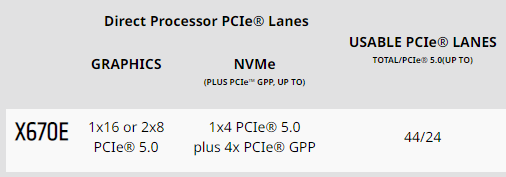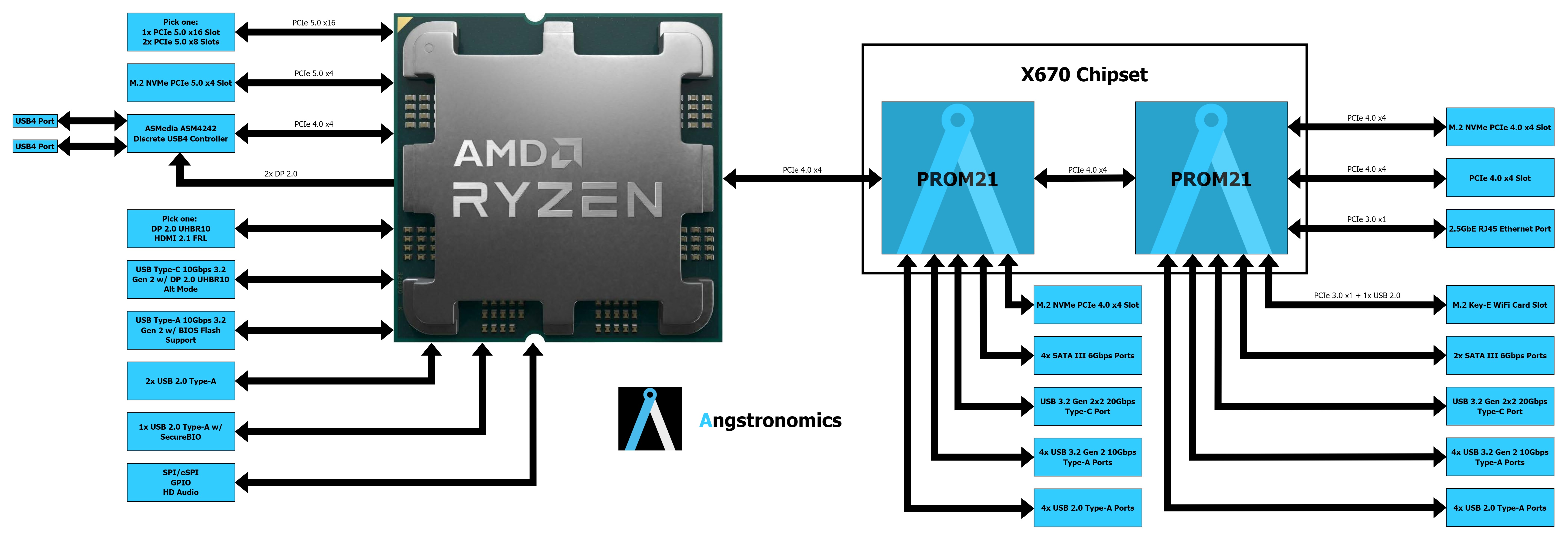Will two Samsung 990 PRO 1tb and a Radeon RX 7900XT have enough available bandwidth to use the full speed of those disks in RAID0 14,900/13,800 (2 x 7,450/6,900 MB/s)?
There are now motherboards from Asus that have M.2 PCIe 5.0 that should have enough bandwidth on Infinite Fabric lanes. But i’m somewhat lost when trying to understand how this works.
In theory yes… but you lack the most important info, the CPU model and his PCIe lanes…
and the X670E motherboard tier/model
I assume you got nothing of this and its only a future buy for a new system…
“the full speed of those disks…” thats what the OEM says or you saw it somewhere… now in real life all kind of user system configuration systems… we only can hope the best for it.
EDIT: PCIe 5.0 from CPU for GPU and NVMe but the 990 its a PCIe 4.0…so
PROM chipset PCIE 4.0
28 PCIe Lanes from AMD Ryzen cpu.
Your right. its just speculation about my next system. But these are the motherboards that have two 5.0 m.2 sockets.
Asus motherboards
The processor that im thinking about is the Ryzen 9 7950X. However I would prefer not to buy Asus.
A single Samsung 990 PRO has 7,298 MB/s read and 7,011 MB/s write so I wonder how close I could come to doubling those numbers with RAID0 and if available bandwidth would limit transfer speeds when there is also a powerful GPU on the PCIe interface.
Again… this is all theory numbers, i cant vouch for any numbers, only a user with same NVMe disk model and a RAID setup can give you some thoughts in performance (disregarding his chipset), but regarding hw resources i cant see a limitation on those Asus X670E, my opinion only, all the best.
EDIT:
Ok but if the device only negotiates the PCIe 4.0 signal, that all he needs and thats what the motherboard will give to him.
Theres no “real” advantage of using that 990 PCIe4.0 on a PCIe5.0 slot if it cant use use all the bandwidth signal from 5.0 that the mb can give.
Usually and this may be related to motherboard OEM design, we avoid mixed hw devices generations (PCIe/SATA etc…), to prevent the so call lane bandwidth “equalizing”… but this a modern chipset and with plenty of space slots for allocation.
AMD offical Ryzen 9 7950X3D / AMD AM5 X670/E

But you wont be having PCIe 5.0 GPU…not that 7900XT ou XTX so why question this?
But are the m.2 5.0 slots. even if the disk only works in 4.0 mode is available bandwidth not 5.0?
or does the whole interface slow down to 4.0 speeds?
The read/write numbers while treating small sized files (e.g. 4KB) will never be doubled by a RAID0 array. Since it are mainly short or very short files, which are read or written while doing normal PC work, you may not even realize the speed enhancement.
According to my own experience the performance gain is not worth to risk the loss of all RAID0 data in case of a deficiency of one of the array members.
My opinion: Users, who have a very good NVMe SSD and access to a PCIe4.0 port, should not create a RAID array. A system with 1 single SSD runs much more stable than a system with a bootable RAID0 array.
I had raid0 setup in a asus rog strix 2023 model with ryzen 9 7945hx with 2 990 pro-1tb drives and got 14660 seq read and 13880 seq write speeds using crystal disk. Used read and write-back cache set to on. CPU power settings were set to windows balanced settings. Could have broken 15000 had I jacked to turbo in armoury crate. Rocket ship. Try it out. Make a system image backup of current system to fall back on. Small file transfer speeds were un-remarkable.
@grudd61
Thank you for your report and contribution for the thread owner (cue) doubts.
I just wanted to try the raid0 out . I went back to ahci because of the conflicts with alot of software raid causes. If I go back to raid, will save the scores for validation.
Im looking for stable. if its crash prone/unstable, that would be a deal breaker for me.
Data loss is not an issue, but downtime is.
I seem to recall that Samsung SSDs have a lower failure rate than Intel processors (I cannot find the source for this claim of mine).
RAID0 would cut reads/writes in half for each disk, so lifetime should be longer barring any faults with the disks.
Thank you for the feedback ![]()
Are you using the computer daily? Are you noticing stability problems, crashes and such like?
Did you notice if trim was active?
Does Samsung Magician read and monitor the disks correctly?
Why did you use software but not hardware RAID?
Was it on a Windows OS?
no stability problems or crashes at all. Ran for 2 or 3 days. Magician says “unknown devices” , and can’t perform any functions. There are several other programs that can not tell whats up with storage, but can’t recall them at the moment. Trim worked properly. Was Win 11 pro system 22H2 with may Cumulative update. Machine is a laptop.
Ran like a scalded rabbit. VERY fast response to all commands. I Always run nvme ssd systems with hibernation off…sysmain off, and windows search off. Just create system image of your current setup, then try the raid. Just remember to switch back to ahci in bios before restoring the current system that you created if and when you want to return to previous [ non-raid] setup.
The stability of a system cannot be evaluated within 2 or 3 days.
Only good for a scratch disk I think. Wouldnt trust raid for OS unless we are doing a unix z type array in a freebsd server but even that can fail if not have enough drives.
This project got delayed. I just bought the motherboard, memory and case, they are on their way.
Any must have data is on a constant backup.
Why don’t you trust RAID 0?
Read/write should be 50% less for each disk. so less disk wear.
M.2 disks are extremely reliable. Im more worried that the motherboard or PSU might fail rather than the disks.
Don’t you backup your data? What happens if a disk fails in your world?
Are you still running this setup?
Is the computer stable?
I just bought the Gigabyte X670E Aorus Xtreme. I plan to use it with 2x 2tb Samsung 990 pro disks in RAID 0.
Looked over the specs of the Gigabyte X670e Auros Extreme and think you can’t go wrong with this board. As opposed to my MSI Godlike this board sacrifices a PCI-E slot for two M.2 slots which all go to the cpu though using all of your cpu bound m.2s would force your gpu x16 slot into x8 operation like mine and also your remaining pci-e slots are directed through the chipset. I personally like having my OS on an independent non raided M.2 slot because restoring backups are easier. Weird things can happen when you go through the raid controller and I have personally experienced restored backups refusing to boot because of a raid driver issue or something that takes half the day to figure out in a command window.
Even raid 1 I wouldn’t trust only because I am not familiar with AMD and I don’t know what I don’t know. Though my backup plan for my home computers are occasional Macrium backups. Sometimes you have to create WinPE bootable usb restore sticks with your motherboard raid and chipset drivers baked into the restore disk or you might find issues trying to boot the Macrium restore image. Happened to me couple times. Point is nothing is guaranteed and data security experts advise you run a mock disaster drill to see that everything is working but if your machine is only for gaming or something like that go raid 0 for the operating system as you can always install fresh. I sometimes do that as its just easier in my world.
Thanks
Thank you for looking over the specks.
Stability and HDD speed are my main goals, naturally, or I would not bother with RAID 0 ![]()
I think you would need to be incredibly unlucky for your 990 pro to fail, im guessing the failure rate is less than 0.11% like the 980 pro.
Do I understand you correctly, are you using whole system image backup?
Why not just backup data and set-up a new OS if failure occurs, I dont understand the benefit?
I have continues backup so I never lose any data.

